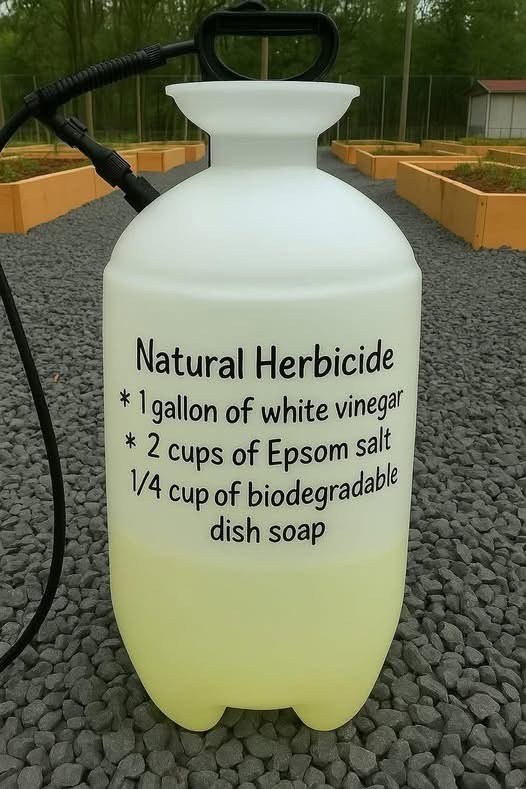
The Power of Natural Herbicides: A Safe and Effective DIY Weed Killer
In recent years, more and more gardeners and environmentally-conscious homeowners have turned away from synthetic chemicals in favor of natural alternatives. One of the most talked-about and effective methods for controlling weeds without harming the earth is a simple DIY natural herbicide made with ingredients commonly found in your home: white vinegar, Epsom salt, and biodegradable dish soap.
This eco-friendly formula offers a safer alternative for families, pets, and pollinators while still packing a powerful punch against unwanted weeds.
What Is This Natural Herbicide?
As displayed in the image above, this homemade herbicide is made by combining:
- 1 gallon of white vinegar
- 2 cups of Epsom salt
- 1/4 cup of biodegradable dish soap
Let’s break down what each ingredient does and why this mixture works.
The Ingredients: How They Work
1. White Vinegar (Acetic Acid)
Vinegar is the key component in this natural weed killer. With about 5–20% acetic acid concentration, it works by drawing moisture out of plant tissues. The acid breaks down the cell structure, effectively desiccating the leaves and stems of most small, non-woody weeds.
Why it’s effective:
- Fast-acting on annual weeds
- Readily available and affordable
- Leaves no toxic residue in soil
Caution: Vinegar is non-selective, so it can damage any plant it touches. Use it carefully around your desired crops.
2. Epsom Salt (Magnesium Sulfate)
Epsom salt is often used in gardening to promote healthy plant growth, but in large quantities, it can help kill weeds by increasing the soil’s salinity. High salt concentrations interfere with a plant’s ability to absorb water, ultimately dehydrating and killing it.
Why it’s effective:
- Disrupts moisture uptake in weeds
- Enhances the desiccating effect of vinegar
- Helps prevent regrowth in treated areas
3. Biodegradable Dish Soap
Dish soap doesn’t kill weeds directly, but it acts as a surfactant—this means it reduces the surface tension of liquids. When mixed into this herbicide, it helps the vinegar and salt adhere to the waxy leaves of weeds rather than running off.
Why it’s effective:
- Helps the solution stick to weeds longer
- Ensures better coverage and absorption
- Biodegradable options reduce environmental impact
How to Use This Natural Herbicide
Instructions:
- Mix the Ingredients: In a large container or spray bottle, combine 1 gallon of white vinegar, 2 cups of Epsom salt, and 1/4 cup of biodegradable dish soap. Stir or shake until the salt fully dissolves.
- Application: Spray directly onto weeds on a warm, sunny day for best results. Make sure the leaves are well-coated but not dripping. Avoid oversaturating the soil.
- Repeat as Needed: Some tough weeds may require multiple applications over a few days. Avoid spraying after rainfall to maintain effectiveness.
Best Uses and Limitations
Ideal for:
- Driveways and sidewalks
- Gravel pathways
- Garden borders (away from crops)
- Fence lines
Limitations:
- Less effective on deeply rooted or perennial weeds
- Will not kill weed seeds
- May need frequent reapplication in rainy climates
Environmental Benefits
Choosing a natural herbicide like this one has several advantages:
- Non-toxic to pets and children when dried
- No long-term soil contamination
- Biodegradable ingredients
- No synthetic chemicals that can harm pollinators, aquatic life, or beneficial insects
Important Tips for Success
- Apply during the hottest part of the day in full sun.
- Avoid spraying during windy conditions to prevent drift onto desirable plants.
- Store any leftover mixture in a sealed container for future use.
Conclusion
This simple DIY herbicide is an excellent tool for those seeking a greener lifestyle and a more natural approach to gardening. While it’s not a cure-all, it offers a highly effective method for spot-treating weeds in a way that aligns with sustainable and safe gardening practices.
By harnessing the power of common household items—white vinegar, Epsom salt, and biodegradable dish soap—you can fight back against weeds without compromising your commitment to a healthier planet.